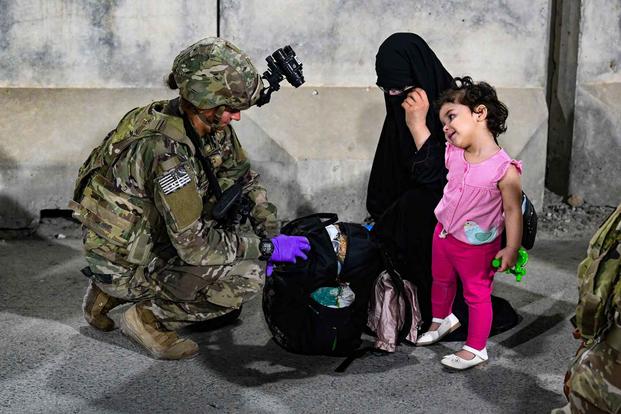
Paratroopers assigned to the 1st Brigade Combat Team, 82nd Airborne Division, based out of Fort Bragg, N.C., facilitate the safe evacuation of U.S. citizens, Special Immigrant Visa applicants, and other at-risk Afghans out of Afghanistan from Hamid Karzai International Airport in Kabul, Aug 22., 2021. (DoD photo)
The program that allows Afghan allies to immigrate to the U.S. would get 12,000 new visas under a government funding deal expected to be released in the coming days, lawmakers and advocates said.
While short of the 20,000 visas they were originally pushing for, supporters of the Special Immigrant Visa, or SIV, program were elated that thousands more visas are on track to be approved after they feared the program could run out of visas for good.
“While this won’t be enough visas to help all our Afghan allies, this gives us some breathing room and will show our partners in America’s longest war that we won’t leave them behind,” Shawn VanDiver, a Navy veteran and president of the #AfghanEvac coalition, an umbrella organization for hundreds of nongovernmental groups that help evacuate Afghans, said in a statement late Tuesday.
VanDiver, who said he was briefed on the deal, added that the 12,000 visas are an “unequivocal win.”
House Foreign Affairs Committee Chairman Mike McCaul, R-Texas, also announced the 12,000 visas at a hearing Tuesday about the messy 2021 U.S. military withdrawal from Afghanistan in which Republicans railed against the Biden administration’s handling of the evacuation of Afghan allies.
“Can’t say, ‘Hey, we left them behind and we’re not going to give them a visa to get out of there,’ right?” McCaul said in announcing the SIV deal.
The SIVs are part of a funding package for roughly half of federal agencies that are facing a Friday night deadline for Congress to renew their funding or else they will shut down. Among the agencies awaiting funding is the State Department, which administers the SIV program.
Congressional leaders and the White House announced Tuesday morning they had reached a spending agreement, but the text of the deal had yet to be released as of Wednesday morning, raising the prospect of at least a short lapse in government funding this weekend as the House and Senate churn through lengthy floor procedures.
The inclusion of the visas in the funding deal was first reported by Punchbowl News.
The SIV program, which was created in 2009 to give Afghans who served as interpreters for the U.S. military a path to escape Taliban threats to their lives, has about 7,000 visas remaining of the 38,500 Congress has previously approved over the years. With the State Department issuing about 1,000 visas per month, the program was on track to run out as soon as August if lawmakers did not agree to approve more.
But tens of thousands of Afghan allies are still waiting for visas. As of the State Department’s most recent quarterly report on the program in September, more than 67,000 completed SIV applications were awaiting what’s known as chief of mission approval and another nearly 11,000 Afghans were awaiting their visa interviews after receiving that approval.
News that the program is getting an infusion of visas comes amid revived scrutiny of the 2021 withdrawal following Tuesday’s House Foreign Affairs Committee hearing.
As part of his ongoing investigation into the U.S. military withdrawal from Afghanistan, McCaul brought in retired Gens. Mark Milley, the former chairman of the Joint Chiefs of Staff, and Frank McKenzie, former head of U.S. Central Command. Both testified publicly about the withdrawal in 2021 to the House and Senate Armed Services committees, but Tuesday’s hearing marked their first opportunity to speak about the withdrawal under oath since they left uniform.
At Tuesday’s hearing, both former military leaders blamed the State Department for the chaos of the withdrawal. While McKenzie said he was sounding the alarm about the need for an evacuation in mid-July 2021, the State Department was the agency responsible for ordering the evacuation of U.S. citizens and Afghan allies, and did not do so until Aug. 14. At that point, the Taliban was encircling Kabul, and both Milley and McKenzie described the State Department’s timing as “too little, too late.”
“The fundamental mistake, fundamental flaw was the timing of the State Department’s call of the NEO,” Milley said, using the acronym for noncombatant evacuation operation. “I think that was too slow and too late.”
 Afghanistan Peace Campaign
Afghanistan Peace Campaign